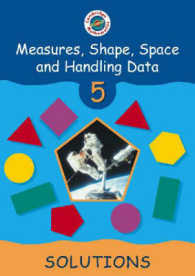- ホーム
- > 洋書
- > 英文書
- > Psychology
Full Description
Process Facilitation in Psychoanalysis, Psychotherapy and Social Work elaborates a differential theory of therapeutic engagement with full reference not only to psychoanalysis and to psychotherapy but also - surprisingly - to social work. When contemporary social work with the marginalised achieves mutual constructive collaboration, social workers characteristically notice an unfolding process. Could this correspond to the 'analytic process' of psychoanalysis?
Sylvia O'Neill seeks to explain theoretically, and to illustrate clearly in practice, just how a quasi-autonomous therapeutic process becomes established. The theory underpinning the book is Jean-Luc Donnet's conceptualisation of the establishment of the analytic process in psychoanalysis through introjection of the analytic setting. Donnet designates the psychoanalytic setting as the analytic 'site'. O'Neill proceeds to trace, by means of detailed clinical discussion, the analogous process by which a viable therapeutic process can become established through created/found discovery and introjection of the relevant 'site' or setting in psychoanalytic psychotherapy and in social work. Amongst the most important elements are the practitioner's internalised theoretical principles.
The book demonstrates that unconscious introjection figures more importantly in effective therapeutic engagement than a conscious therapeutic alliance. An important corollary for social work is that, contrary to popular myth, no prior psychological-mindedness is required. The differential theory of Process Facilitation in Psychoanalysis, Psychotherapy and Social Work is equally relevant to psychodynamic counselling.
Contents
Introduction.
Part One: 'LINES OF ADVANCE IN PSYCHOANALYTIC THERAPIES'
Chapter 1. Lines of Advance, Then and Now: Continuum, or Radical Break?
Chapter 2. Donnet's Concept of the Analytic Site or Ensemble
Part Two: PSYCHOANALYTIC PSYCHOTHERAPY
Chapter 3. Juliana and her Faithless Boyfriend: The Psychotherapy Site in a Twice Weekly Therapy
Chapter 4. The Dark World of Incest: The Psychotherapy Site in a Once Weekly Therapy
Chapter 5. Thraldom to Narcissistic Objects: The Psychotherapy Site in a Three Times Weekly Therapy
Chapter 6. Satish's Weekend: Drama on the Stage of External Reality
Part Three: SOCIAL WORK
Introduction to Part 3
Chapter 7. Miss M: The Site in Social Work with a Vulnerable Adult
Chapter 8. Engaging Families "Mired in Deep Distress"
Chapter 9. A Question of Allegiance to the Social Work Frame of Reference
Chapter 10. After Starting Where the Client Is, What Next?
Chapter 11. Weathering a Crisis: Relationship with the Social Worker as Touchstone
Chapter 12. Ruth and Mrs F: The Site in a Social Work Case of Non-Accidental Injury to a Child
Chapter 13. Joining the Discourse of Contemporary Social Work
Part Four: CONCLUSION
Chapter 14: A Differential Theory of Therapeutic Engagement








